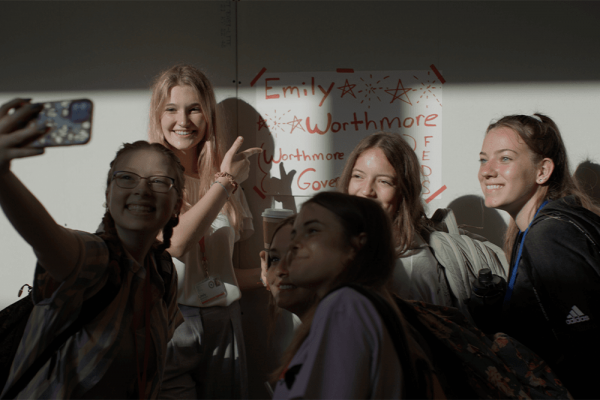Heading into an election year, directors Amanda McBaine and Jesse Moss knew the importance of chronicling how young people, especially young women, are working through political disillusionment. The directors follow up their 2020 release of Boys State with a “sibling” documentary in 2024’s Girls State, which follows the week-long experience of 500 high school girls who gather for a mock-government camp in Missouri.
The backdrop for the film is the waxing and waning motivation young people in the U.S. have toward elections. Despite record-breaking turnout in 2020’s general election, where half of Americans between 18 and 29 cast a ballot, Axios polling finds that 58 percent of voters between the ages of 18 and 34 aren’t sure they’ll vote in November. While the attendees at girls and Boys State — summer leadership and citizen programs funded and sponsored by the American Legion and the American Legion Auxiliary, respectively — are younger than voting age, McBaine and Moss follow the program as a way of displaying young political imaginations at practice.
“I think it was important for us to not wait to get the film out because I think that the climate is crowded and we also wanted to put the film in front of young people,” Moss told Sojourners. McBaine also shared that she hoped the documentary would be a source of encouragement to young people to get more politically active.
Across both Boys and Girls States, high school juniors gather for a week to learn the ins and outs of American politics. McBaine and Moss’ Girls State follows girls as they build a mock government, from elections to forming a Supreme Court. The film, now streaming on Apple TV+, debuted at the 2024 Sundance Film Festival.
McBaine and Moss said one surprising and rewarding experience was documenting how the girls formed genuine friendships across political differences. This came through most poignantly through grounding the film in the perspective of Emily Worthmore, a self-identified conservative and Christian who enters the program planning to run for governor, which is the highest office at Girls State. When she first introduces herself in the documentary, she shares her wide variety of extracurriculars, from participating in leadership clubs like Key Club to being on sports teams for lacrosse. As she finishes listing, she pauses: “I'm missing things ... Oh, and I started a Bible study.”
Conservative bridge-builder
In the film, Worthmore describes herself as staunchly conservative and says her political values are rooted in her faith. But she also aims to stress bipartisanship in her campaign for Girls State governor. Girls State was filmed in 2022 and captures the subjects’ reactions to the May leak of the Supreme Court’s decision to overturn federal abortion rights.
“Personally, I’m pro-life … but I wouldn’t try to convince somebody who is not,” Worthmore tells her lunch table in the documentary. “Maybe I’d share my opinion and talk to them, but I don’t think it’s something that’s worth, like, ‘No, become pro-life.’”
Worthmore told Sojourners she knew running for governor would require her to gain support from girls with very different political views from her own. As tempting as it may have been to hide her views, she instead decided that she was willing to be open about where she stood on certain issues and take the time to listen to those whom she might disagree with.
McBaine and Moss said following Worthmore was an opportunity to defy audience expectations when it came to conservative Christian politics.
“I liked that [in our “sibling documentary”] Boys State, we had a protagonist who enters a conservative space, and we flip the script with Girls State and have a conservative Christian in a liberal space,” Moss said.
The audience for documentaries, according to the directors, is usually left leaning. McBaine said following a conservative protagonist asks audiences, “Can you root for this kid as she goes through this camp, even though at times she’s going to be vocal about her politics?”
McBaine told Sojourners that meeting Worthmore was one of the “big joys” of the project.
“Emily’s politics are not my politics and yet I think there’s something so relatable about her,” she said. “She has a big heart. She means well and has an incredible superpower for listening. She’s passionate about our country. She is deep in her faith.”
Moss said Worthmore “rewards our faith” in her even if not everyone watching may share in her politics. In the film, Worthmore takes time to examine the funding discrepancies between Missouri’s Boys and Girls State programs. In the film both camps are taking place at the same location for the first time in their history, inviting scrutiny toward funding differences. Through her investigation and interviews, Worthmore found that there is a significant budget difference between the Girls State and Boys State programs which leads to inequality in regard to access of resources and speakers that are available for the Girls State programs. At the end of the documentary, she publishes a post on the Girls State website entitled “Incompatible for Comparison” where she shares some of her findings.
“The budget for Missouri Girls State’s attendance of around 500 delegates is roughly $200,000 according to director Macae Mickens. Comparatively, the budget for Missouri Boys State for this year’s session is roughly $600,000 with just over 800 in attendance,” Worthmore reports.
Dialogue and church hurt
Worthmore, now a college student, told Sojourners she hoped that her participation in the documentary wouldn’t suggest she’s a “black-and-white, super conservative.” And she acknowledged the tension between her desire to promote bipartisanship and some of the tenets of her faith. “I'm the type of conservative that can listen to both sides, even if I don't necessarily agree on all things,” she said.
Worthmore is not the only young person hoping to find a balance between conviction and dialogue. According to a 2020 study from the Springtide Research Institute, more than 4 in 5 people between 13 and 25 say that it is “important to try to understand both sides of a political issue.” The study’s introduction argued that “[Young people] are missing models of productive, healthy dialogue from many adults in their lives.”.
But Worthmore knows that the desire for dialogue in her generation is matched by a similar disillusionment.
“I know a lot of people who might not want to get super involved in politics and not even want to vote because they either don’t feel educated enough to vote or they hate all candidates equally and they don’t want to vote,” she said.
Worthmore said she hopes Christians and politics can return to emphasizing the core tenets of Christianity being about love.
“Christianity is about love, and there's a lot of people that say that all conservatives and Christians are super judgmental, but also the Bible says we’re not the ones who get to judge,” Worthmore said. “So, at the end of the day, I sin as much as the next person, maybe differently, but I would rather be somebody who can kind of be a healing force in the world for that, because I know a lot of people have been hurt by religion.”
Worthmore said that had “tons of friends who have been hurt by the church,” especially because they were LGBTQ+.
“I’d rather you have Jesus in your life and be gay than not,” she said. “I really hope that people who have had trauma from the church can see that Christianity isn’t bad.”
Got something to say about what you're reading? We value your feedback!





